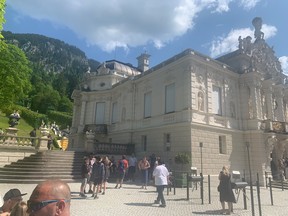
Reviews and recommendations are unbiased and products are independently selected. Postmedia may earn an affiliate commission from purchases made through links on this page.
Article content
HOHENSCHWANGAU, Germany – Please take as many exterior snaps of those gleaming white towers and parapets as desired, amid the Alpine foothills, greenery and waterfalls.
Advertisement 2
Article content
From its viewing platform at the enormous gate or across the Pollat Gorge at Marien Bridge, Neuschwanstein Castle is a year-round photo op from the moment its towers pop into view from the Autobahn. But there are 150 years of quirky history inside King Ludwig II’s fantasy palace.
Article content
Gold furnishings, one kilo’s worth, hold a visitor spellbound in and around the two-storey Byzantine Throne Hall alone, with intricate murals and a one-ton chandelier that required 600 lit candles in its day. At your feet, two million polished stones form a mosaic of plants and animals, as Ludwig likened his role to divinity between heaven and earth.
Though Ludwig only stayed in his costly chateau a total of 172 nights, he slept on an intricately carved oak-panelled canopy bed, surrounded by paintings, tapestries, gilded mirrors and every incarnation of swans.
Article content
Advertisement 3
Article content
Neuschwanstein — New Swan Rock – was Ludwig’s contribution to mid-19th century Europe’s collective mania for medieval fables and embracing of nature. These same mountains, dark forests, lakes and hamlets were where the Brothers Grimm had recently written their classics such as Hansel and Gretel, Rapunzel and Cinderella.
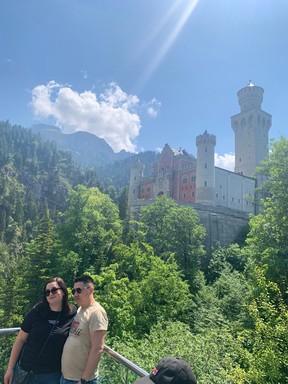
Today’s tourists can make this two-hour drive a day trip south to the mountains from Munich or north from the Austrian border. German Autobahns have no tolls nor speed limits, though an informative full-day Gray Line bus tour from Munich worked for us.
We first past wells from which water for official ‘Munchner bier’ must be drawn – local monks called it liquid bread and consumed five to 10 litres a day — then small cathedral towns and humble farms, some with just one cow or goat. The bus tour includes Linderhof Palace, with its Baroque façade and garden fountains and lunch at Oberammergau, a village of woodcutters and artisans.
Advertisement 4
Article content
Then Neuschwanstein gradually reveals itself, perched high above its smaller cousin Hohenschwangau, the surrounding town of the same name and the crystal blue lakes Alpensee and Schwansee.
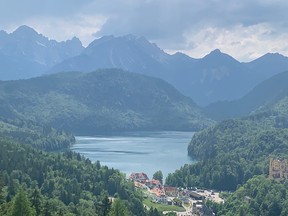
‘Mad’ Ludwig — we’d call him eccentric today — grew up influenced by the Grimms, his parents’ love of the outdoors, and a desire to emulate the French court of Louis XIV, the Sun King. Unprepared for the Bavarian throne at age 18, the nation and its allies lost an 1866 war with Prussia and the depressed Ludwig slowly withdrew from reality to his fairy tale fixation with Neuschwanstein.
Demolishing remains of an older castle on the rocky outcrop, sandstone, limestone and marble were hauled uphill (avid walkers can climb it in a leisurely half hour today, with a shuttle bus or horse-drawn cart available).
Advertisement 5
Article content
Ludwig wanted emphasis on Norse legends to please his good friend Richard Wagner, thus the many design homages to Wagner’s epic operas and a theatre meant to host them. But in keeping with his age of innovation, Ludwig installed Bavaria’s first telephone. He kept 60 servants, but the unmarried king preferred solitude.
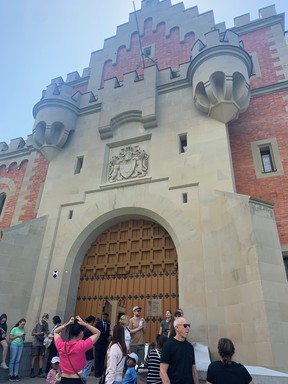
It took 16 years and the deaths of at least 30 workers before Ludwig finally moved into the still-unfinished castle and, before its completion, he drowned two years later in mysterious circumstances at a nearby lake. His grand extravagance had bankrupted the nation and within weeks of his death, Neuschwanstein opened as a public museum to recoup the losses.
More than 60 million have since visited, including Walt Disney, who drew on the concept for Sleeping Beauty Castle for his first theme park in 1955. A strict no-video policy is in place and some areas are closed for restoration, but weather permitting, many bay windows are open for spectacular views of the region. There’s a cafe and terrace to enjoy a cold post-tour Ausgustiner while overlooking the village and the Alps.
Advertisement 6
Article content
Only 12 of the planned 200 rooms were furnished, which unfortunately provided lots of storage for stolen European artwork by Nazi officials during the Second World War. Far from the threat of Allied bombing, Hitler planned to make Neuschwanstein a personal museum of the confiscated masterpieces before they were recovered.
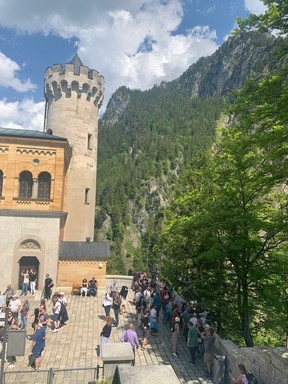
LINDERHOF WORTH A STOP
The palatial project that Ludwig did live to complete – and one not to miss – is Linderhof, in all its Rococo splendour.
Not far from Neuschwanstein, also set in the Alpine foothills, it’s smaller, but just as opulent inside and features gardens, cascades, sculptures and a grotto (under repair until 2024). Much of Linderhof reflects Ludwig’s obsession for Versailles after he’d visited Paris, with a Hall of Mirrors and grand staircase, while formal portraits hanging throughout are 18th century French nobility, not Bavarians of Ludwig’s time.
Advertisement 7
Article content
About 90% of the collection, including nearly 100 vases from India and Asia, is original, including a 19th century ‘pianino’ in the music room, one of only five in the world.
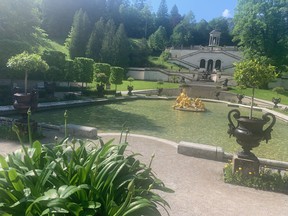
Also on view, the massive royal dining table as it was in the 1860s. Though he had a king-sized appetite, the 6-foot-3 Ludwig didn’t like servants around when he ate, so most of his eight to 12 meals a day were prepared a floor below and the table winched up to his private quarters. He usually dined alone, though the table might be laid out for four, as it was said he enjoyed talking to long-dead members of the French court.
Two corresponding garden terraces, with lavish waterworks and 30 marble steps to a music pavilion, are all part of a 50-hectare scenic park.
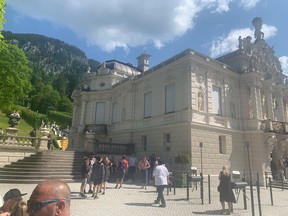
IF YOU GO
Air Canada/Lufthansa serve Munich directly. The interiors of Neuschwanstein and Linderhof can only be viewed on a guided tour, costing C$22 and C$15, respectively, but for under $100, a family or two partners can purchase a 14-day pass to take in more than 40 sites including the many palaces in and around Munich associated with Ludwig.
For more information, visit museen-in-bayern.de/infopoint, simply-munich.com/guides or grayline.com/germany.
Article content
Stay connected with us on social media platform for instant update click here to join our Twitter, & Facebook
We are now on Telegram. Click here to join our channel (@TechiUpdate) and stay updated with the latest Technology headlines.
For all the latest Travel News Click Here

Comments
Postmedia is committed to maintaining a lively but civil forum for discussion and encourage all readers to share their views on our articles. Comments may take up to an hour for moderation before appearing on the site. We ask you to keep your comments relevant and respectful. We have enabled email notifications—you will now receive an email if you receive a reply to your comment, there is an update to a comment thread you follow or if a user you follow comments. Visit our Community Guidelines for more information and details on how to adjust your email settings.